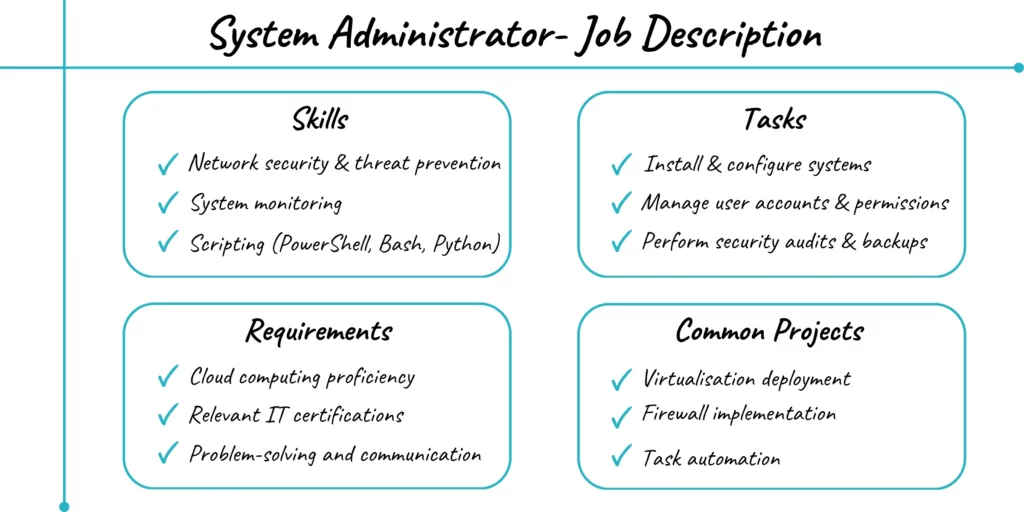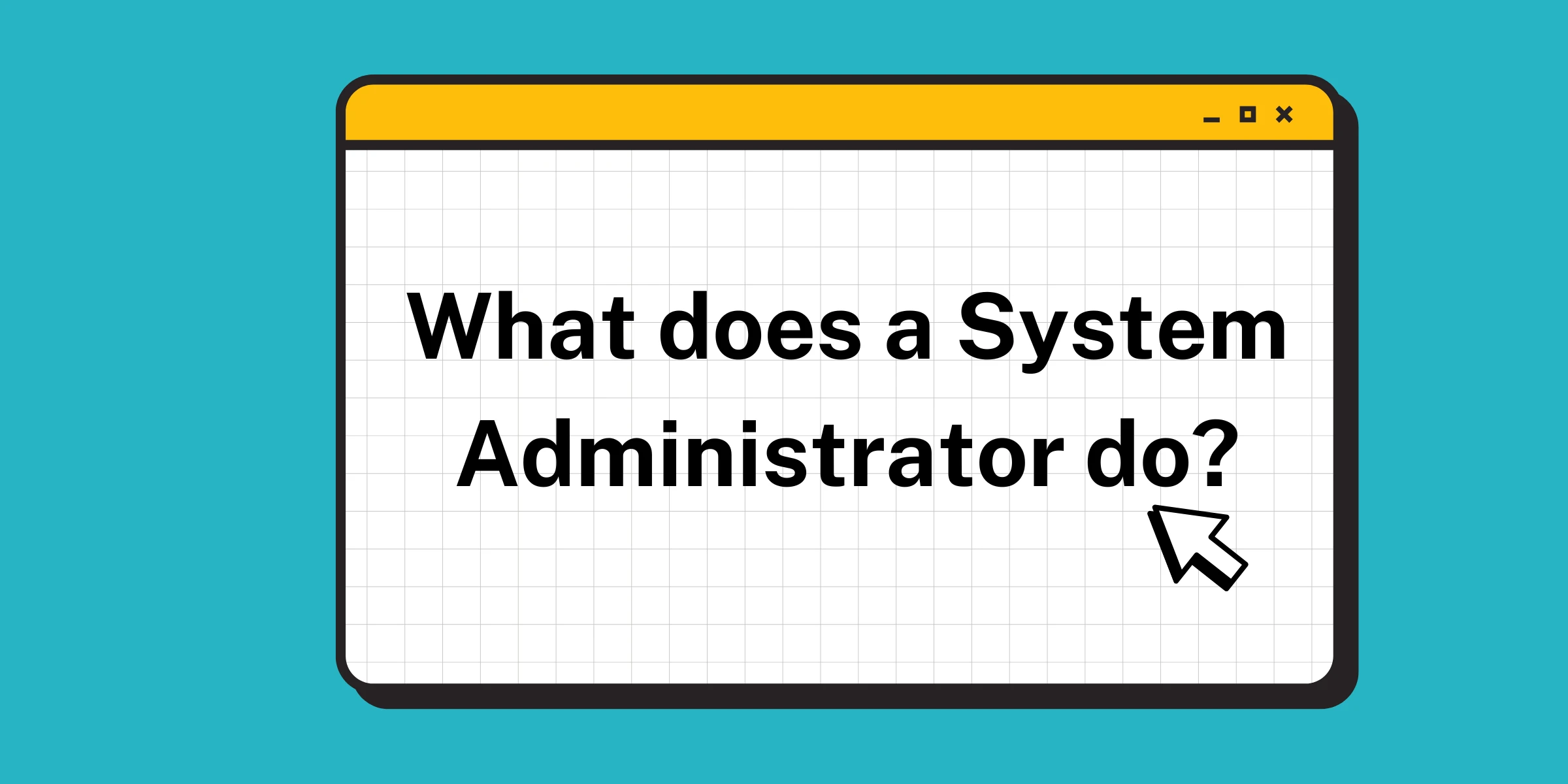System administrators, often referred to as sys admins or sysadmins, serve as the foundation of a company’s IT setup—they keep computers and network systems running smoothly. Their role in IT administration extends far beyond basic maintenance, encompassing a wide range of technical and strategic responsibilities.
What is the article about?
What are the daily tasks of a System Administrator?
A system administrator’s daily tasks involve installing, configuring, and maintaining servers, networks, and computer systems. Furthermore, they manage software updates, handle security patches, and troubleshoot technical issues that arise during operations. Specifically, their core responsibilities include:
- Managing user accounts and access permissions
- Implementing robust security measures and firewalls
- Conducting regular system backups and maintenance
- Monitoring network performance and resolving bottlenecks
- Providing technical support to employees
To excel in this role, IT administrators need a blend of technical expertise and interpersonal skills. Accordingly, proficiency in operating systems, cloud computing platforms, and network management is essential. Moreover, strong problem-solving abilities and clear communication skills are crucial for explaining complex technical issues to non-technical staff.
Working hours often extend beyond regular office times, as IT systems administrators ensure minimal system downtime and availability. Their work environment varies, with opportunities available across various industries, from healthcare and finance to government sectors.
What is System Administration?
System administration forms the foundation of modern IT operations, encompassing the installation, maintenance, and optimisation of computer systems within organisations. This field primarily focuses on ensuring reliable operations, implementing security measures, and maintaining optimal system performance across diverse computing environments.
The scope of system administration has expanded beyond traditional Linux and UNIX systems to include cloud infrastructure, DevOps, and Site Reliability Engineering (SRE). Sysadmins play a crucial role in maintaining stability and security, especially in industries handling sensitive data like healthcare and finance.
Their responsibilities go beyond technical upkeep—they bridge technology and people, ensuring smooth system operations while supporting employees in their daily tasks. As guardians of IT resources, they balance performance, security, and cost-efficiency, working tirelessly to maintain system uptime and prevent disruptions.
Success in this field requires broad technical expertise and adaptability rather than deep specialisation in a single area. As digital transformation accelerates, sysadmins must continuously evolve, mastering new technologies while staying committed to system reliability and security.
What Are the Responsibilities of a System Administrator?
The daily responsibilities of an IT systems administrator encompass a broad spectrum of technical and operational duties. Initially, these professionals focus on maintaining optimal system performance through regular monitoring of CPU usage, memory utilisation, and network traffic.
System administrator job descriptions primarily include these core responsibilities:
- Installing and configuring hardware, software, and network infrastructure
- Managing user accounts and implementing access controls
- Conducting regular security audits and system backups
- Troubleshooting technical issues and providing user support
- Maintaining comprehensive documentation through internal wikis
Subsequently, sysadmins oversee the deployment of software updates, creation of user groups, and implementation of operating system policies across IT networks. They work diligently to ensure proper data storage, backup procedures, and retrieval systems are in place.
Additionally, these professionals take charge of virtualisation platforms, data centre firewalls, and load balancers. They develop automated scripts for routine tasks and maintain detailed documentation of system parameters. IT administrators also play a crucial role in educating users about technical procedures and best practices.
Consequently, the role demands flexibility in working hours, as Sysadmins often handle critical infrastructure maintenance outside regular business hours. They serve as the first line of defence against technical issues, ensuring minimal system downtime and maintaining business continuity through proactive monitoring and swift problem resolution.
Where Do System Administrators Work?
The workplace environment for system administrators typically involves long hours at a desk, working with technical tools and office equipment. Many sysadmins go beyond standard office hours, often staying on-call to ensure system reliability and uptime. Their expertise is essential across various industries, including education, healthcare, finance, aerospace, and IT consulting, where organisations rely on them to maintain secure and efficient systems.
The structure of their role depends on organisation size. In smaller companies, sysadmins often juggle both system and network administration, whereas larger enterprises separate these responsibilities into distinct roles. Regardless of the setting, sysadmins rarely work in isolation—they are part of collaborative IT teams, ensuring that technology runs smoothly and meets business needs.
Essential Skills for System Administrators
Fundamentally, success in system administration requires mastering both technical expertise and interpersonal capabilities. A proficient IT administrator must possess a robust foundation in technical skills, primarily focusing on system and application management through tools like VMware.
The essential IT skills include:
- Network security implementation and threat mitigation
- Scripting proficiency in PowerShell, Bash, or Python
- Backup management expertise
- System and application configuration
- Cloud computing platform knowledge
- Performance tuning and system monitoring
- Patch management and system upgrades
- Server administration and database administration
Similarly, soft skills play an equally vital role in system administration. Strong communication abilities enable administrators to explain complex technical concepts to non-technical staff. Problem-solving capabilities and adaptability remain crucial for tackling unexpected technical challenges and embracing new technologies.
Time management proves particularly important, as Sysadmins often juggle multiple priorities whilst maintaining system uptime. Evidently, the role demands continuous learning, especially with emerging technologies like artificial intelligence reshaping the IT landscape.
Ultimately, IT systems administrators must stay up to date with industry trends and security practices. This includes understanding virtualisation, storage technologies, and encryption methods. Professional certifications, such as AWS Certified SysOps Administrator and Microsoft Azure Administrator Associate, can enhance career prospects.
How to Become a System Administrator?
Building a career as a sys admin requires careful planning and dedication. Primarily, aspiring professionals can choose between two educational pathways – a traditional degree route or a skills-based approach focused on certifications and practical experience.
A bachelor’s degree in computer science, information technology, or related fields provides a comprehensive foundation. Nevertheless, the field increasingly values practical skills over formal education credentials. Many successful Sysadmins have built their careers through technical certifications and hands-on experience.
For those seeking certifications, these options prove particularly valuable:
- CompTIA Network+ and Security+ for networking fundamentals
- Microsoft Certified Solutions Expert (MCSE)
- Linux Professional Institute Certification (LPIC)
- VMware certifications for virtualisation expertise
Hands-on experience is key for aspiring Sysadmins, as most employers seek three to five years in the field. Internships and personal projects help build practical skills early on. Since technology is always evolving, continuous learning through workshops, webinars, and industry events is essential. Many start in entry-level IT roles like help desk or desktop support, gaining the Windows and user support experience needed to move into system administration.
Conclusion

System administration offers a dynamic and rewarding career with strong growth potential beyond 2025. Professionals who blend technical expertise with strong interpersonal skills open doors to diverse opportunities, especially in emerging technologies. Continuous learning, certifications, and proficiency in cloud computing, cybersecurity, and automation are key to career advancement. As IT infrastructure becomes more complex, skilled sysadmins remain essential, ensuring system reliability, security, and business continuity while enjoying both professional and financial rewards.


